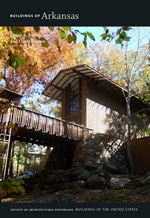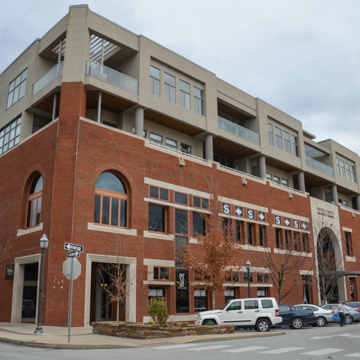Buildings on the east side of Fayetteville Square were razed in the mid-1970s to make way for the First National Bank. Its architects, all graduates of the University of Arkansas’s School of Architecture, employed scale and familiar materials to make this large building compatible with the buildings that surround the square. The red brick echoes that of the former post office (WA10) that occupies the center of the square and other neighboring structures. When constructed, the building’s two-story facade was in balance with the size of buildings around the square, and its third floor was limited to the rear portion, but in 2007 two stories of condominiums were added to the building’s front. The organization and grouping of the windows of the lower two stories are reminiscent of Frank Lloyd Wright’s early-twentieth-century work, although the double-height triumphal-arch-shaped entrance dilutes the building’s Wrightian flavor. The most impressive aspect of this building is the cathedral-like interior of a central space formed by seven square bays of robust brick arches springing from equally robust brick piers. The bays are lit by a continuous skylight that runs the length of the central arcade. The building was constructed for a long-established local banking family but has changed ownership several times since.
You are here
One East Center (First National Bank)
If SAH Archipedia has been useful to you, please consider supporting it.
SAH Archipedia tells the story of the United States through its buildings, landscapes, and cities. This freely available resource empowers the public with authoritative knowledge that deepens their understanding and appreciation of the built environment. But the Society of Architectural Historians, which created SAH Archipedia with University of Virginia Press, needs your support to maintain the high-caliber research, writing, photography, cartography, editing, design, and programming that make SAH Archipedia a trusted online resource available to all who value the history of place, heritage tourism, and learning.


